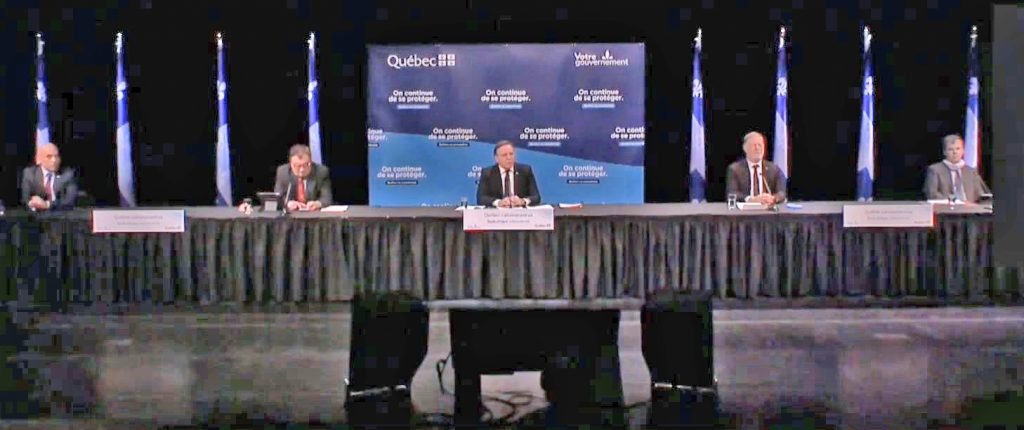‘The pandemic hit us with full force and created a humanitarian challenge,’ said Mayor Demers
With Marc Demers – the mayor of one of Quebec’s cities with an especially high concentration of families – seated beside him, Premier François Legault announced in Montreal last week that children’s summer daycamps will be allowed to open in June, as efforts continue to turn the coronavirus crisis into a recovery effort.
Daycamps opening

“I know many people are concerned about daycamps for kids,” Legault said during a COVID-19 webcast and press conference held at Place des Arts in downtown Montreal.
“I’m happy to announce that the public health authorities have given us the green light to re-open the daycamps on June 22,” Legault said. “Of course, it will be with distancing rules. But it’s very important for kids to play outside, to play together.”
The announcement was sure to be greeted with great relief in Laval and across the province by the many parents who’ve been diligently caring round the clock for children without a break, because daycares and schools have been closed since mid-March.
Camp monitors needed
While noting that social distancing protocols will be applied in the daycamps, Legault acknowledged that the government is currently facing a challenge recruiting enough monitors to supervise the children, principally because a larger than normal number of monitors will be needed.
Still, Legault warned, “The crisis isn’t over. It’s still hard. There are still many adjustments to be made. Not everything is perfect. I see some who are being critical and I ask you to be patient. We are living through a crisis.”
Answering journalists’ questions on the distancing rules to be enforced in the daycamps, Dr. Horacio Arruda, the director of public health for Quebec, said the emphasis will be on ensuring that groups of children remain small. He said there would be twice as many monitors for the children than would normally be the case.
Reducing the impact
“With more monitors, this will, in my opinion, facilitate the reduction of the impact of transmission in these camps,” Arruda said.
“On the other hand, what needs to be understood is that the coronavirus is circulating, although children get off relatively easy. So it’s not to say that just because some cases turn up in a daycamp that it will be a catastrophe. I would like people to understand that this too will be part of life returning to normal. But we will be keeping a close eye on things.”
Regarding the COVID-19 situation in Laval, which was the Quebec community hardest hit last week by the coronavirus, Legault said he had met that morning with Mayor Demers and they agreed the situation was getting better.
Use face masks, says Legault
“But we must stay vigilant,” said the Premier, advising that wearing a face mask while using public transit is one of the best ways people in general can do their part to keep COVID-19 from spreading.
Concerning the recovery process, Legault said, “We continue to gradually re-open. But if the contagion re-starts, we’ll have to come back to a pause. So nobody wants that and the best way to avoid it is to respect the instructions. To win this battle we must play as a team. I’m counting on you all.”
For his part, Mayor Demers noted that on Monday May 25, the beginning of the end confinement measures would be starting in Laval and the first of a series of businesses that were closed would be re-opening.
“The pandemic hit us with full force and created a humanitarian challenge, a sanitary challenge, and one that is economic,” said Demers.
Recovery underway, says Demers
“In Laval, our solidarity allowed us to create over the past few years a lively, united community, a strong economy and sound finances. I am convinced that this same unity is essential to confront the current pandemic. This will allow us to ensure a full recovery and to succeed with relaunching our economy.”
Demers was also asked by journalists for his explanation as to why the COVID-19 situation in Laval has become so troublesome and with a much higher infection rate.
“Right now I cannot answer that,” he said. “But one thing that my previous job taught me is to make sure that we have less victims as possible from now on, and making sure we are helping everybody who is in trouble. Later on we will be trying to find out why all those things happened.”














